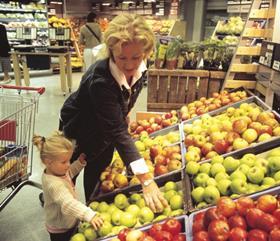
The decline in the US economy has led consumers to become more price sensitive as they reduce spending on food away from home and lean towards shopping at hard discounters, such as Wal-Mart and Costco, according to Rabobank’s 2009 North American Food & Agribusiness Outlook.
Although the trend towards eating more regularly at home will benefit the fresh produce sector, the report, produced annually by the Rabobank Food & Agribusiness Research and Advisory (FAR) team, predicts overall sales of fresh fruits and vegetables are expected to decline slightly as people become more aware of the food they buy and try to waste only a minimum amount.
“The downturn in the economy has reversed the way consumers shop,” said FAR vice-president Stephen Rannekleiv. “Five years ago, there was a growing trend of US consumers willing to pay more for high quality, luxury goods. Today, there has been a 180 degree turn.”
Instead of buying fresh products, consumers are expected to shift to whole commodities, the report said. The majority of consumers will continue buying fresh produce, but during a period of an economic downturn it will be difficult to attract new customers who are currently buying frozen and canned produce, as fresh prices are expected to be the limiting factor.
The frozen segment, meanwhile, could potentially profit as it still has a fresh image and is at the same time more convenient than whole commodities that need to be chopped and sliced prior to consumption.
There will also be a growing consumer-preference trend toward discounters, such as Wal-Mart and Costco, which will put pressure on other retailers to keep prices low. In addition, demand for private label products has increased as consumer seek greater value for money. “There is a generalized return to frugality across all levels of society,” said Mr Rannekleiv.
On the whole, the report said consumers are cutting back on all discretionary spending and cutting out waste, which is forcing beverage marketers and retailers to work harder to convince consumers to spend more. “In fact, it is possible that this mindset could prevail beyond the current economic downturn,” said Mr Rannekleiv.






No comments yet